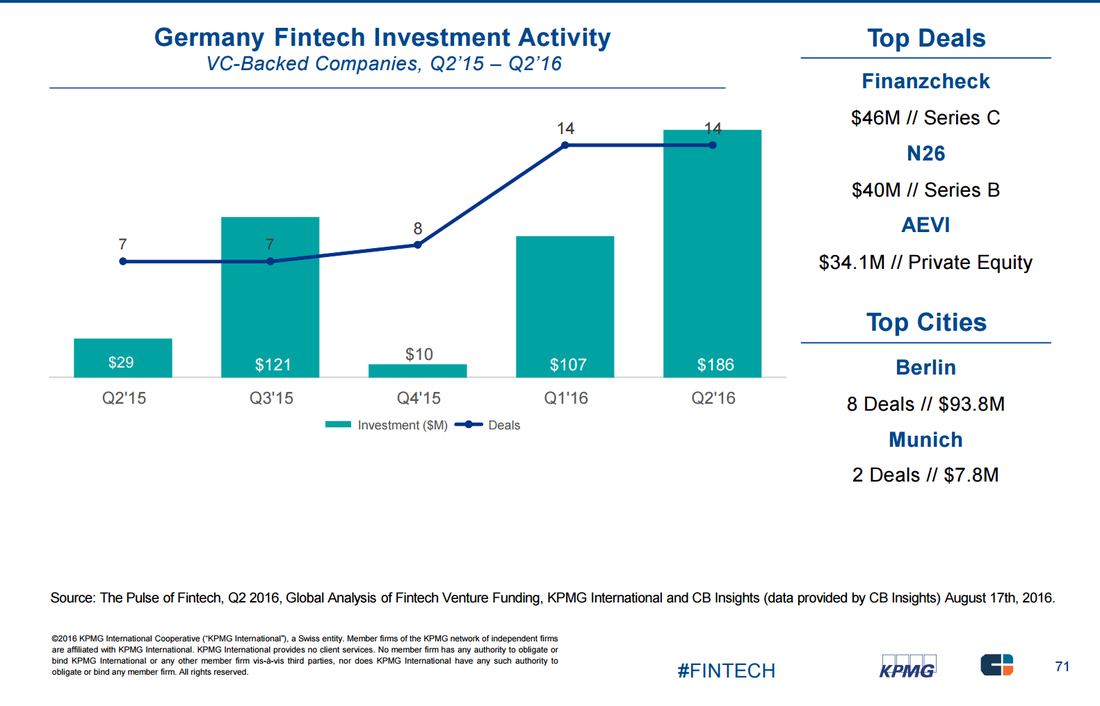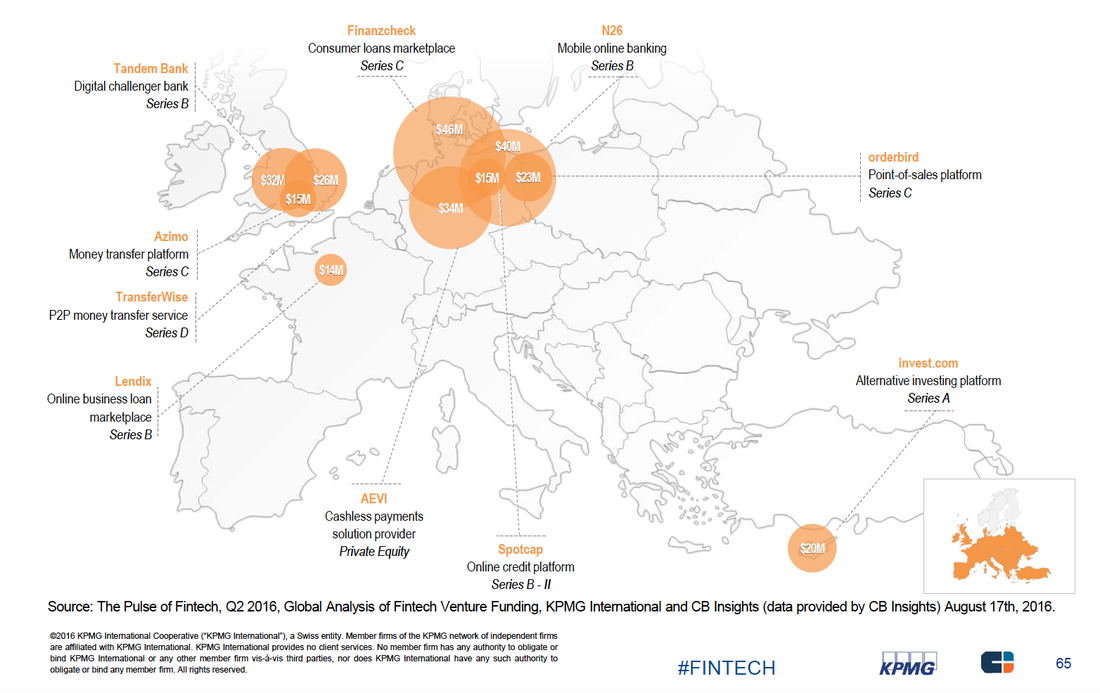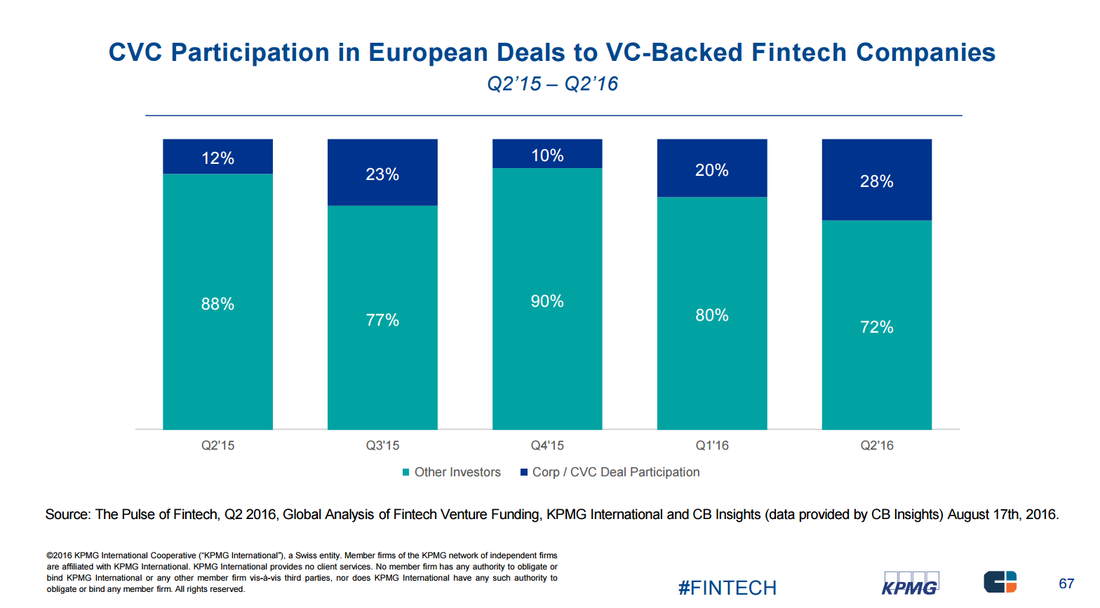Germany recently received quite bad news that could affect its economy and financial system. In order to settle the claims in the diesel emissions scandal, Volkswagen agreed to pay about $15 billion to the US authorities and Deutsche Bank, the country’s largest bank, received a $14 billion charge (pending final settlement), again from the US authorities, for mis-selling residential mortgage-backed securities (RMBS) in the 2008 financial crisis. However, we will see its not all bad news for Germany. In the second quarter of 2016, the investments received by VC-backed German financial technology companies, have been 80% higher than those for UK ventures, and its fintech ecosystem is now growing at a good pace.
According to a new report from CBInsight and KPMG International, in Q2 2016, the funding activity on fintech startups slowed compared to Q1, which was under all aspects a record quarter in North America and Asia. However that’s not applicable to Europe, where despite all the concerns of the Referendum vote, investments have grown again, with $369 million raised across 43 deals, and with Germany largely responsible of this increase, with investments that grew from $107 million in Q1 to $186 million in Q2.
The UK paid for uncertainties of the Referendum vote, which now represents a challenge and an opportunity for the whole European market. We agree with Anna Scally Partner, Head of Technology, Media and Telecommunications, and Fintech Leader, at KPMG in Ireland, when she says that: “Market access and the ability to passport services across the EU are hugely important for fintechs, regardless of their origin or stage of development. Post-Brexit, maintaining a pro-business approach in Europe is critical and these issues will likely feature strongly in discussions between the EU and UK.”
It’s interesting to note that in Germany it’s not just Berlin that does well with technology, Munich plays also an important part, as well as Hamburg, that is where Finanzcheck, one of the fastest growing fintech company in Germany, is located, and Frankfurt, home of the Frankfurter Wertpapierbörse (Frankfurt Stock Exchange), the world's 10th largest stock exchange by market capitalization, and that is now growing as the country’s fintech hub.
There were no mega rounds of financing in Europe, in both the first and the second quarter, but we have anyway seen some considerable investments, including:
These were the three biggest rounds of financing in Europe, and all the companies mentioned are based in Germany (see the image below).
It’s interesting to note that in Germany it’s not just Berlin that does well with technology, Munich plays also an important part, as well as Hamburg, that is where Finanzcheck, one of the fastest growing fintech company in Germany, is located, and Frankfurt, home of the Frankfurter Wertpapierbörse (Frankfurt Stock Exchange), the world's 10th largest stock exchange by market capitalization, and that is now growing as the country’s fintech hub.
There were no mega rounds of financing in Europe, in both the first and the second quarter, but we have anyway seen some considerable investments, including:
- $46 million in a Series C round, raised by Finanzcheck, a consumer loans marketplace,
- $40 million in a Series B round, raised by N26 (previously known as Number26), a mobile online bank,
- $34.1 million through Private Equity, raised by AEVI, a cashless payments solutions provider.
These were the three biggest rounds of financing in Europe, and all the companies mentioned are based in Germany (see the image below).
Another interesting aspect is the increase of corporate participation in fintech investments. Corporations participated in 28% of the deals conducted, a percentage that’s much higher than the 12% registered in the same period of 2015. The corporate participation in the industry is expected to evolve more in the months ahead, with traditional financial institutions and banks that are showing an increasing interest in investing, buying and collaborating with fintech companies.
The industry is now growing and evolving, not just in Europe but all over the world. Germany is building up what it seems to be a solid financial technology ecosystem, with the appetite to involve key cities and not just a single location, and it is now well positioned to play a bigger role in the financial technology industry in the future.

About the author - Alessandro Ravanetti
Alessandro is Co-founder & CMO of Crowd Valley. He has worked in the fintech industry, with marketplace investing and lending, since 2011. Has built and managed digital companies with distributed teams and international partners, and gained experience with both startups and large corporations, having worked with British Telecom, Bloomberg and the Grow VC Group.
Alessandro grew up in Italy, where he graduated with a B.A. in Economics at University of Parma, before to obtain a M.S. in Finance at Regent’s University London. He studied and worked in many different cities, including Munich, Geneva, London, Barcelona and Valencia. Genuinely passionate about financial technology and innovation, he loves to spend his spare time traveling and discovering new cultures. You can find him on Twitter at @aleravanetti.
Alessandro is Co-founder & CMO of Crowd Valley. He has worked in the fintech industry, with marketplace investing and lending, since 2011. Has built and managed digital companies with distributed teams and international partners, and gained experience with both startups and large corporations, having worked with British Telecom, Bloomberg and the Grow VC Group.
Alessandro grew up in Italy, where he graduated with a B.A. in Economics at University of Parma, before to obtain a M.S. in Finance at Regent’s University London. He studied and worked in many different cities, including Munich, Geneva, London, Barcelona and Valencia. Genuinely passionate about financial technology and innovation, he loves to spend his spare time traveling and discovering new cultures. You can find him on Twitter at @aleravanetti.





 RSS Feed
RSS Feed